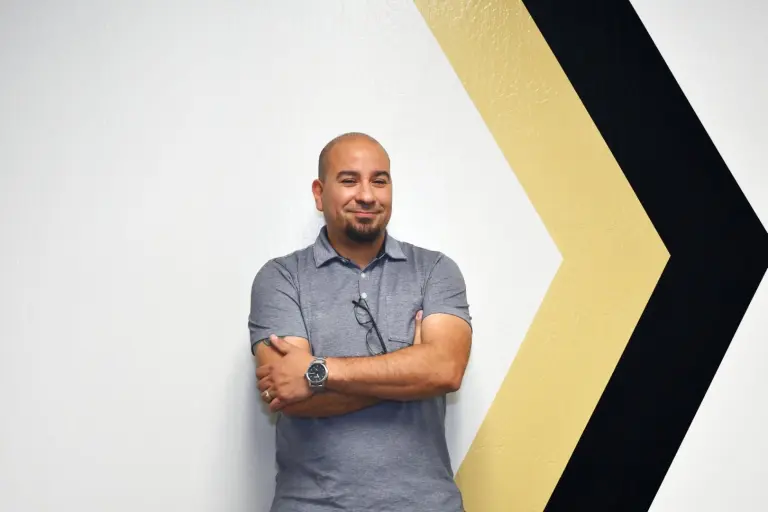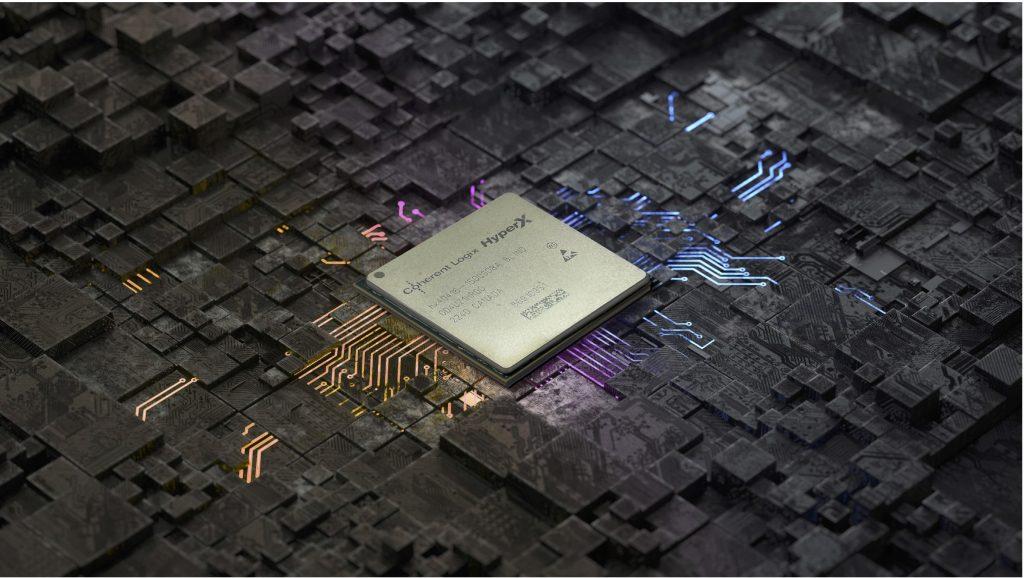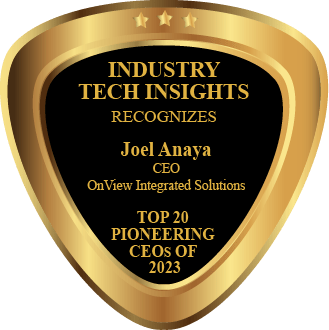
- July 18, 2025 4:07 pm
- California

Joel Anaya, CEO of OnView Integrated Solutions, has been instrumental in building the company from the ground up. His innovation and vision transformed the way the company has scaled its business. OnView is a security provider bringing proactive solutions specifically designed to deter suspicious behavior in real-time before the crime occurs.
He is a passionate crime fighter and integrator with a law enforcement background and a security technology background. He focuses on customers’ needs by identifying their pain points and partners with his customers in infiltrating criminal activity. He is truly talented in designing proactive deterrent solutions and thinking outside the box to be more disruptive in crime deterrence.
Joel is more of a role model. He is self-made and didn’t follow anyone’s lead role in where he is today. He credits the men and woman he served with throughout his law enforcement career and utilized the power of networking with the community, allied agencies, and businesses to fight crime in partnership.
“A partnership is important with implementation because solutions are more effective when everyone plays a role.”
Intelligent Tech
OnView greatest technology is their nuisance alerting system. This is a good example of developing new ways to combat criminal activity. Their Nuisance Alert System allows the customers to alert OnView when nuisance activity is present. Today, nuisance activity is rarely handled with law enforcement response. Now, community services resource officers and mental health advocates respond to most calls the public believes to be a nuisance. “We put a system in place that disrupts and deters activity when observed by our customers. We created a way for our customers to alert us when they observe activity and need response.” Just another idea Joel brought to the company that became a game-changer in our crime deterrent solutions. “What separates us from our competitors is our ability to deploy security response, nationwide.”
The company’s integrated Crime Deterrent System with video intrusion technology provides a canopy of virtual protection, leaving your customers with a virtual security guard watching over their property and community. They utilize Immix, a central monitoring platform, coupled with analytic deterrent software, to monitor criminal elements and events accurately and effectively. OnView sets the bar high when it comes to perimeter defense. The reason is, they have several layers of protection from the outside in. This model includes motion-activated video alerts, audio & visual deterrent devices that activate upon detection, and On-demand Guard Response. They include network and system communication redundancy and implement cyber security protocols to enhance protection against internal and external threats to their operations and customer interest.
They have replaced the old traditional courtesy patrol model with a more proactive approach to suppress criminal activity. “We developed and deployed our own version of On-Demand Guard Response, nationwide. This is very similar to UBER. We partnered with security companies throughout the country and created a new successful profit-sharing model that incentivizes the responder to respond,” explains Joel. “Our customers now have an extra layer of physical response for video verified events. This helps the security industry in all facets, including law enforcement. On-demand Guard Response has a huge impact on crime deterrence.” This allows OnView to provide a complete solution to our customers. Their solution offers opportunities for both industries, private security, and video monitoring. By bridging the gap between the two industries, we now have a bigger advantage in stopping crime in real-time.
Joel believes their sales strategy separates them from their competitors. “We’ve noticed the stigma surrounding private guard services is a marketing pinpoint our competitors use to sway customer sales,” elucidates the steadfast leader. “The truth is, without physical security response, your left with calling the police as your only option. Today, the is a dark cloud hanging heavy over law enforcement. The morale is at an all-time low, and most agencies have a huge vacancy deficit to fill. That leaves non-emergency type calls or nuisance related events to go unanswered. In most police agencies across the country, nuisance type calls have a non-response protocol in place. The new norm is to file a report online and hope for the best.”
Making Customers a Priority
For OnView, customers are the priority. Every nuisance-related event is responded to, virtually or physically. They have released On-Demand Guard Response through innovation and consistent development as a new factor in non-emergency response. “That is how we are changing the traditional standardized private security services sector.”
Private communities that experienced criminal activity such as auto burglary, package thefts, break-ins, trespassing, and loitering paid an average of $72000-144,000 – annually security solutions. The results made minimal impact on crime reduction. Bad google reviews and the negative experience stayed consistent. In one case, OnView had a customer ready to file bankruptcy after noticing a consistent decline in tenant occupancy: several million-dollar losses. After installing OnView Crime Deterrent systems, the reduction in criminal activity was immediate and substantial. OnView reduced criminal activity by 80% within the first month and 95% by the end of the quarter. The cost caparison was significantly different for stationary security guards onsite, round the clock, and remote video monitoring. OnView saved the customer thousands of dollars annually, changed the tenant experience with a positive impact on vacancy rates, and increased the property’s value by several millions of dollars.
That same customer (owner of the community property) believed in OnView; he became a board member. “Most of our customers have similar circumstance and experiences. Customers who preferred to keep their current physical security services onsite, we simply vetted and onboarded their preferred security provider and turned them into one of our partners,” says Joel. “Another example on how we help our On-Demand Guard Response partners generate new net profit within our portfolio.”
Towards the Future
One of OnView’s biggest achievements is the way they pivoted from a private security company with over 300 security guards and moved towards technology to increase better results and ROI. They have scalability that allows them to reach across the country. One of the biggest accomplishments OnView has had was forming a global partnership with one of the largest VARs in the world. Leveraging sales and marketing through their global partnership gives the company astronomical growth potential and nationwide scalability.
Joel plans on taking OnView solutions to the next level. The nuisance alerting system is the next phase in active deterrence. They have some of the most talented engineers and developers aligned with OnView vision and direction and are planning to roll out another version of On-Demand Guard Response that will certainly be a game-changer. “I would like to highlight our customers and staff that really helped with OnView’s success. Without the talented crime analyst agents and support from our customers, our growth wouldn’t have been possible.”

The Unique Solutions
The company offers powerful Systems on Chips (SoCs) and a software suite for creating customized solutions. And the current flagship is HyperX Midnight, a radiation-hardened supercomputer class SoC designed for use in LEO, MEO, and GEO (low-, middle-, and geosynchronous earth orbit) satellites.
HyperX Midnight, soon after its release, became the most advanced space processor available, with roughly four times the computing throughput at half the power demand of competitive chips.
“This is a significant step, as performance and power consumption control the magnitude of a satellite. We put enormous performance in a small package with low power obligations, so our customers can use much smaller satellite busses (chassis) which conserves millions in launch budgets,” says Walt. Another key feature of Coherent’s HyperX multi-chip modules compared to its competitors is that its chips are C-programmable and use familiar tools and debugging processes. “The solutions can be built on our chip in about 6 months whereas competitive FPGA offerings usually require 24 months of development time using complex hardware development languages and a very difficult process called timing closure,” he adds.
Coherent Logix’s SoCs are also completely reprogrammable, even in space, and can modify tasks in less than 50ns (nanoseconds). These two elements combine to create a huge advantage. Coherent Logix can make four products in the time our competitors take to build just one, and we can continuously enhance those products even if they are in orbit around the Earth.
These attributes herald back to Coherent Logix’s patented invention: the HyperX fabric. And this fabric is common to all Coherent Logix’ chips – both Space-qualified and terrestrial – so these advantages are available whether users are building a satellite, 5G cellular, secure networks, AI platforms, or 8K video encoders. Coherent Logix has served the Space 2.0 and Defense markets for 15 years. High-performance computing (HPC) with low power draw, on-orbit programmability, and ease of modular multimodal MCM design are the keys to success in these markets according to Walt.
The Leader who Makes the Difference
Walt Gall, Ph.D. serves as CEO on Coherent Logix’s executive management team. He is a business leader who builds world-class AI teams, products, and strategic partnerships for top-tier start-ups (Saffron, Intel acquisition) and large corporations (Amazon Devices, Meta (formerly FB).
As CEO of Coherent Logix, the leader in low-power, high-performance C- programmable processors for the embedded systems market, he recently helped guide the company through a funding initiative that raised $85 million.
Under Walt’s leadership, in early 2023 Coherent Logix launched HyperX Midnight, the world’s most advanced space processor, with roughly four times the computing throughput at half the power demand of competitive chips. Coherent Logix is currently in its fourth generation of HyperX processors for Space 2.0 and Defense, Connected Devices, and Media & Communications industries. The company has been granted more than 375 patents and 125 patents are pending.
Over the past decade, Walt has held various leadership roles on executive teams, including Amazon Alexa AI, Meta’s AR/VR and AI divisions, and Intel AI, with responsibilities for annual operational planning, developing a 3-year strategy, and managing more than $500M R&D and production budgets. He led product launches on conversational AI voice assistants on industry-leading consumer and social media devices with cloud-to-edge embedded applications and the development of several enterprise decision-support AI/IOT solutions in wellness, health, hi-tech, and insurance sectors.
Walt’s leadership style is centered on the customer and making data-informed, timely decisions. This customer-centric team approach is critical as the company scales its products and continues to expand its channel partnerships. “I’m referring to our direct customers and strategic partners, our leadership team and employees, and our Board of Directors,” he adds. “We have a collective interest in growing revenue and partnering on developing and commercializing products that have a meaningful impact on society.”
Armed with this mindset, Walt and the rest of the leadership team have skillfully guided Coherent Logix into hypergrowth markets: Space 2.0, cybersecurity, connected devices, media and communications.

Towards the Future
Coherent Logix is adding a cloud-based capability for new customers, universities, and the Maker/open-source community to work with their development tools and hardware. With older von Neumann microprocessor architecture designs and today’s programmable hardware, the software development process is so tedious that it can take 24-36 months for a customer to develop a solution e.g., a WiFi router. Coherent Logix microprocessors, however, have C-programmability and use standard software development processes. They also offer a cycle-accurate simulation platform. These advantages enable Coherent Logix to build solutions in just six months and continue to reprogram or reconfigure as needed to support their product and customer roadmaps with new software-defined functions or as standards evolve. This, combined with the hardware/software co-design process the company uses to build their System on Chips (SoCs), brings the power of digital transformation to the design and use of digital processors – amplifying both the pace of innovation and the competitive advantages of Coherent Logix.
For the near future, Walt is striving towards building highly functioning, distributed teams to bring the most disruptive products to market he has worked on, i.e., a new class of low-power, reprogrammable, high-performance computing devices. Coherent Logix is enabling customers to “redefine hardware as software” (which is also the company’s tagline) to meet the market demand for the flexibility, extensibility, and scalability of software-defined hardware systems and their small SWaP requirements, ranging from space satellites to consumer devices. Coherent Logix’s HyperX architecture provides a paradigm shift in hardware-software co-design from embedded systems to the cloud and delivers a more cost-effective and scalable software-defined device strategy. With its compute and memory co-localized, an event-oriented, parallel processing fabric, low power profile, and C-programmability, this has a 2-4x improvement in the time it takes to develop and launch products. This multi-faceted value proposition extends product customer lifetime value economic models, increasing the ROI for its ODM and OEM partners and customers. Accomplishing these product revenue growths and customer-centric goals will lead naturally to the longer-term goal of positioning Coherent Logix for a successful market exit for its shareholders.
“The future requires low-power, high performance computing for next generation connected devices – it will be everywhere we find a sensor, a camera, a robot, or smart device. As large as the Space 2.0 revolution is, the terrestrial edge and embedded devices will eclipse it by orders of magnitude,” concludes Walt. “We must be as efficient with power as possible. It has a cost to our planet to produce, and it turns into heat when you use it. If we want to preserve our planet, smart everything must become smart, efficient everything.”

" We put a system in place that disrupts and deters nuisance activity when observed by our customers. We created a way for our customers to alert us when they observe activity and need immediate intervention. "
Joel Anaya
CEO